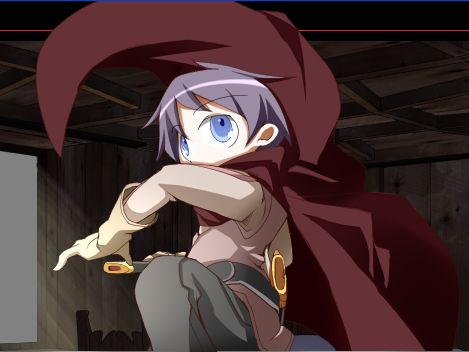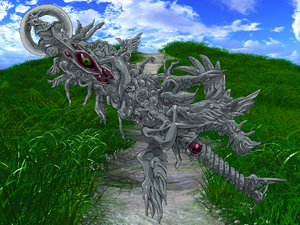ENMEBARAGESI (Enishibbaragesi)
Servant: Saber
Gender: Female
Height: 180 cm
Weight: 69 kg
Three sizes: 87/64/85
Alignment: Lawful Neutral
Appearance: A tall, mature woman with the austere and dignified poise of a true ruler. She possesses the otherworldly beauty of the original humans from the early Age of Gods, with waist-length golden hair that glitters as if the sun’s light itself had been spun into the finest thread and clear eyes blue like the morning sky in springtime. She constantly wears the golden armor granted to her by her patron god, which further magnifies her already impressive presence. A strange hourglass shaped object dangles off a black leather belt tied around her waist, and a white cape with a dark blue underside constantly flutters behind her back, even when there is no wind.
Strength B
Endurance B
Agility B
Magic C
Luck C
Noble Phantasm A++
Class Skills:
* Magic Resistance: B – Cancels spells with a chant below three verses. Even if targeted by High-Thaumaturgy and Greater Rituals, it is difficult for her to be affected.
* Riding: B – Most vehicles can be handled with above-average skill. However, she cannot ride the likes of Phantasmal Races such as Demonic Beast and Holy Beast-rank creatures.
Personal Skills:
* Bravery: A+ – The ability to negate mental influence such as pressure, confusion and fascination. Bonus effect of negating the effects of ‘Charisma’ and ‘Divinity’ up to rank A.
* Charisma: A – Natural talent to command armies; increases the ability of allies during group battles. Can be said to have achieved the greatest level of popularity as a human being in her time.
* Protection from Arrows: C- – Increased defense against ranged attacks. An instinctive predictive ability consequence of exposure to Gate of Babylon way more often than can be considered healthy. A skill Enmebaragesi shares with Heroic Spirit Enkidu; it only works against larger projectiles such as the countless Noble Phantasms in Gilgamesh’s treasury. No benefit is received when under attack by smaller (as in, ordinary) projectiles such as throwing knives, arrows or darts; against attacks with large area-of-effect or against attacks she is not aware of.
* Protection of the Pantheon: A++ – A blessing from Elementals—the formerly-divine Spirits of the no-longer-worshipped Sumerian pantheon—. Identical in effect to Protection of the Fairies, it provides a bonus to one’s Luck parameter in dangerous situations. Bonus effect of automatic rank-up to all parameters except Magic when fighting opponents without Divine Spirit aptitude.
Noble Phantasms:
* Namenanise – Supreme Royal Power I Shall Decree For You Forever
Type: Anti-Fortress
Rank: A++
Range: 1-99
Maximum number of targets: 1000 people
One of the ‘original weapons’ that by all means should be inside that certain king’s treasury, but was returned to its original owner for the duration of her summoning. It is the symbol of the ‘divine authority’ granted to Enmebaragesi by the great Sumerian god Enlil upon her establishment of the city of Nippur as the center of Sumerian faith devoted to Enlil’s worship. If Merodach is the original ‘sword of appointment’ that confers authority to the one who claims it, Namenanise is the original ‘sword of investiture’ that delegates authority from a supreme figure, no matter whether its wielder deserves it or not. It can be considered the prototype of all legendary swords granted by divine entities, such as Durendal and Zulfiqar, as well as all other symbols of divine authority such as Iskandar’s Gordius Wheel.
The only truly tangible component of the sword is the hilt; an assembly of pieces of gold and meteoric iron arranged together like a three-dimensional jigsaw puzzle into an eighteen-centimeters-long, roughly hourglass-shaped grip. The guard is an irregular golden disc, thicker near the center, with the name of the Lord of the Air Enlil engraved in cuneiform on its surface. Unlike Arturia’s Invisible Air, Namenanise is a blade made entirely of air; a contained vortex twelve centimeters wide and one-hundred-and-eight centimeters long. This is the ‘shape’ of the blade, and thus it cannot be manipulated or modified in any manner.
As long as Enmebaragesi carries the weapon in her person, it acts as a second source of prana, gathering residual energy from the stars as delivered by their natural radiation. The amount of prana received in this manner is by no means enough to make Enmebaragesi self-sufficient—it is equivalent to Independent Action Rank B—, and the influx of energy is interrupted whenever Enmebaragesi is indoors and thus hidden from the light of the stars. If the prana input from her Master is sufficient, Enmebaragesi would likely use this extra input to enhance her recovery rate during battle, which is roughly comparable to receiving a rank-up in the Endurance parameter.
It is the same principle which fuels Namenanise’s second use as a destructive tool. Upon invocation of its name, Namenanise rapidly summons not only prana, but all other forms of electromagnetic radiation emitted from visible celestial bodies. The energy is not pulled across light-year distances, but ultimately ‘invoked’ instantaneously with the power of divine spirits that defies physical laws. Regardless of its source, the celestial energy gradually coalesces into a column of the brightest white radiance, which is then unleashed in a swiping attack as a wave of rampaging energy with a conic area of effect which obliterates everything in its path. It is after all an unforgiving divine weapon meant to crush all opposition; both city-states and entire armies are to be reduced to ashes under its might. While its sublime power surpasses even that of the greatest of holy swords, its significantly lower speed is its greatest weakness. Because it relies mostly on energy from external sources, the prana cost to Enmebaragesi is surprisingly low, but the weapon itself is limited to one such discharge for every twenty-four hour period.
* Eduranki – Primeval Temple of Supreme Royal Power, Built on Sacred Ground
Type: Anti-Unit
Rank: A
Range: 0
Maximum number of targets: 1 person
The regal garment of the divinely-ordained queen of all lands. Upon raising the grand temple of Nippur to the king of gods, Enlil, she was invested with the proof of divine favor; a golden suit of armor of awe-inspiring beauty and power. The queen herself becomes a temple, the symbol of the gods’ presence and their sovereignty over all worldly matters.
As long as Enmebaragesi wears this armor, she cannot be harmed by ordinary weapons, no matter who wields them. Only armaments comparable to divine mysteries can possibly hope to pierce the solid defense provided by the temple. Its defensive capabilities are in no way inferior to those of the armor worn by the King of Heroes. However, Eduranki is no mere defensive tool: it is the representation of the will of the gods to preserve the natural order of the world. The armor is a ‘temple’, and the ‘temple’ is a ‘bounded field’ that further imposes the natural ‘Marble’ that is the World and rejects all violations of natural processes. Both Magecraft and true Magic are rendered useless by the wearer of Eduranki. Even crystallized mysteries which have earned a permanent record in the World have their effectiveness reduced when used against the wearer of Eduranki. Both ranks in Divinity and skills or effects that negate the effect of Divinity negate the effect of Eduranki, allowing the subject to use its entire arsenal of supernatural powers against Enmebaragesi without detriment.
Naturally, Gilgamesh once claimed this armor after his conquest of Kish. However, he cannot use it as he has turned his back on the gods. That does not mean he will tolerate the sight of it in the hands of its former owner, though.
Background:
The most ancient of ancient queens, whose name has transcended into legend as the one of the first known historical rulers of ancient Sumer, as well as the name of King of Heroes Gilgamesh’s ‘sister’. According to the Sumerian King List, she was the 22nd ruler of Kish. It was she who unified the Semitic north and the Sumerian south under the hegemony of Kish. Under her rulership, the civilized world was unified in culture, government, faith and even language. It was she who appointed Nippur as the center of Sumerian religion and politics under the theistic authority of Enlil. The city and its main temple became the metaphorical center of the world; the location where kingship was granted upon the chosen human by the gods, not unlike how the figure of the Catholic Pope crowned European kings and emperors several millennia later. In this way, Enishibbaragesi transformed the standard tradition of inheritable kingship into a meritocracy as decided by the Sumerian pantheon. Even long after Kish ceased to be the seat of kingship, the title ‘king of Kish’ was employed to express hegemony over Sumer and Akkad and ultimately came to signify imperial, even universal, dominion.
Her rulership was fruitful and successful, and it was with much rejoice that she accepted the gods’ anointment of her eldest son, Agga, as her successor and next hegemon. The ambitious Agga would then destroy everything his mother had achieved by aiming to trample the southern city of Uruk, where Gilgamesh was ruler. However, she knew it was an inevitable battle, for she knew that the king of Uruk was possessing of boundless ambition, and thus would eventually lust for their divine anointment of universal kingship, regardless of his general disdain towards the gods. Not unexpectedly, Gilgamesh effortlessly crushed Agga, as the sheer magnitude of Gilgamesh’s mere presence was potent enough to make the army of Kish surrender and fall to their knees in worship. Enmebaragesi thus faced the King of Heroes completely alone.
“Do you still wish to fight me, woman?”
“No, I do not,” she responded. “I have witnessed your might and acknowledge you as superior and unmatched in this world. However, it is my duty as former Queen of Kish and as ordained by divine Enlil, my lord, to not relinquish my sovereign blade without a battle.”
After a ferocious three-day battle in which the sky roared and the ground shattered under the might of their clashing weapons, Gilgamesh defeated the former queen and claimed her weapon and armor as his spoils. Instead of killing her, however, Gilgamesh adopted her as his ‘sister’; not because of any fondness towards her, but as a convenient title which allowed her to perform administrative duties in his stead while he was off adventuring and adding objects to his treasury. Enmebaragesi spent the rest of her days as Gilgamesh’s servant and chamberlain, but she never bowed before the King of Heroes. The only reason she stayed alive despite her insolence was her usefulness as a ‘shepherd’ for the ‘cattle’ Gilgamesh ruled over.
Enmebaragesi died believing that Gilgamesh’s vision of what it means to be a ‘ruler’ was wrong. However, she now understands that the idea of ‘divinely-ordained rulership’ is meaningless, for it is not the will of gods which decides who gets to rule and who does not. While she acknowledged Gilgamesh’s combat prowess, she does not find him suitable as a ‘king’. She strongly believes that her most precious possession, the symbol of her own kingship, was taken away undeservedly by an unworthy individual. As a Heroic Spirit, she still carries the strong wish to prove her own worth as a ruler once more. She wishes to prove that her ‘way of the king’ is the right one, and she dreams of the chance to forge a new nation, mighty and harmonious, that would never bow before a meritless ruler.



 Reply With Quote
Reply With Quote






















.png)
